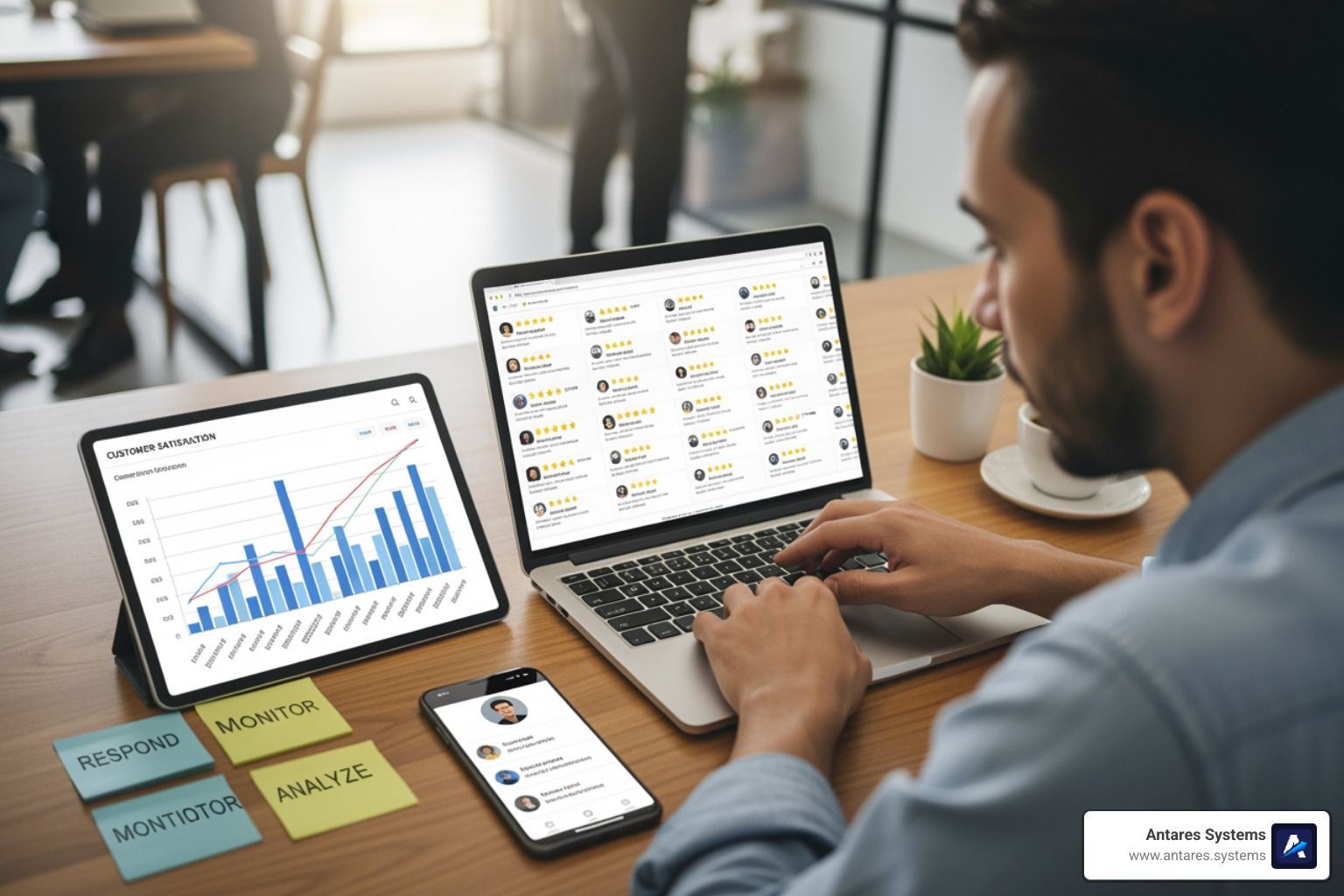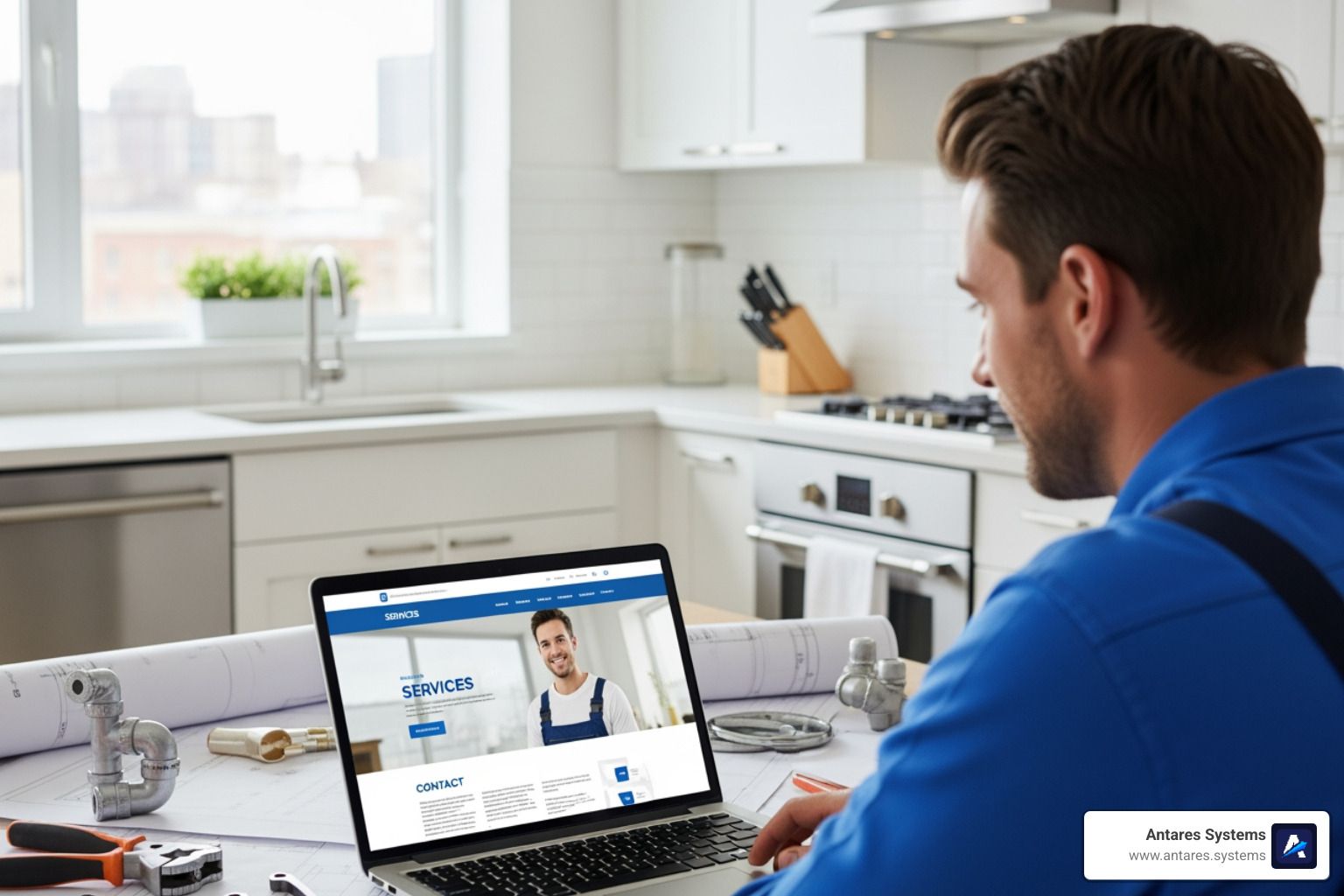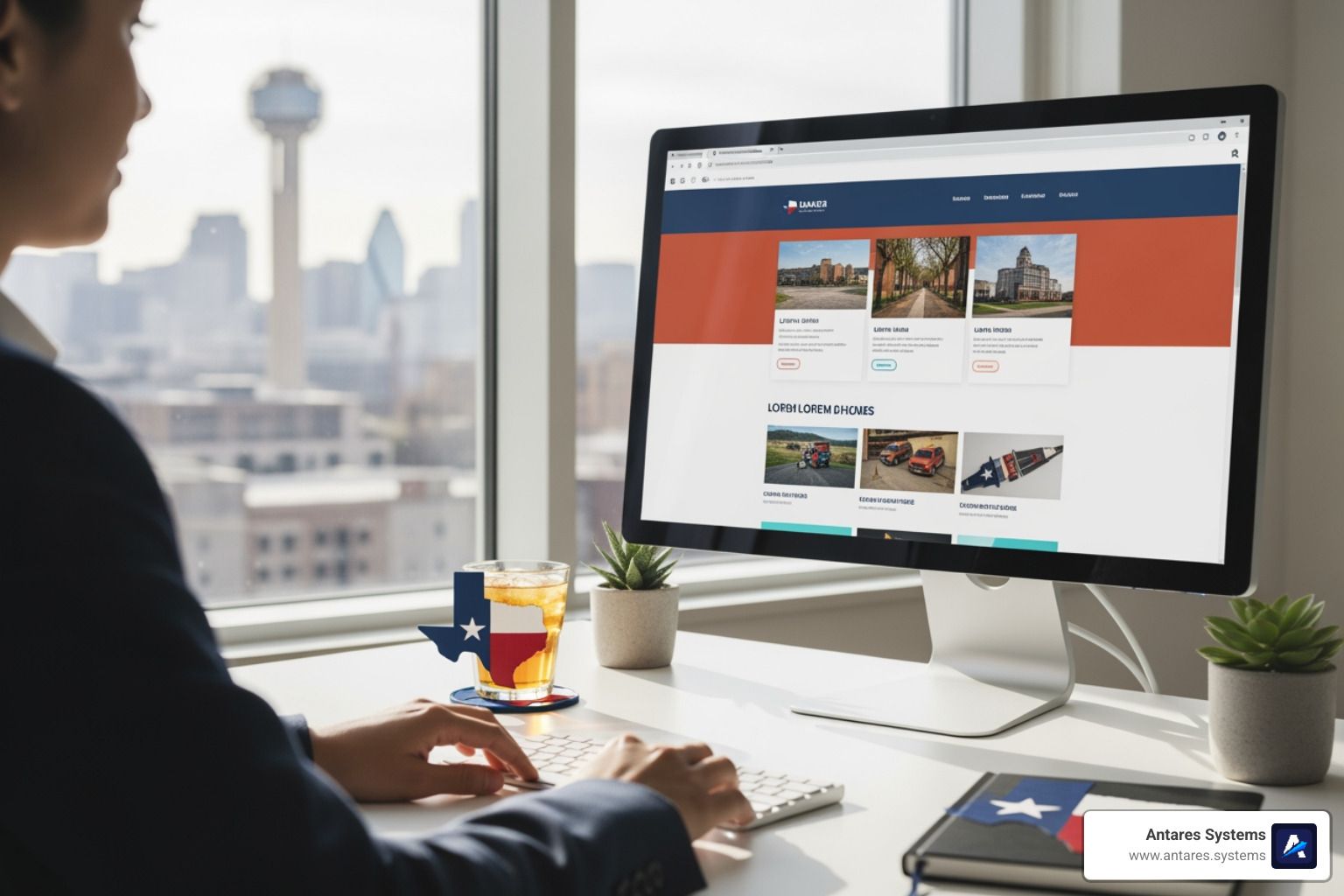From Likes to Links: Boosting Your Small Business SEO with Social Media Magic

Why Small Business Owners Are Turning to Social Media for SEO Success
How to boost SEO with social media for small business is a critical question for smart business owners. The answer is simpler than you might think, but the impact is huge. When you combine the power of social media and organic search, you create a pipeline for growth.
Here's how social media boosts your SEO:
- Drives traffic to your website- Every post linking to your site sends visitors and positive signals to Google.
- Builds brand authority- Active social profiles show search engines you're a real, trusted business.
- Creates backlink opportunities- When people share your content, you earn valuable links.
- Improves local visibility- Social profiles often rank high in local search results.
- Generates social signals- Likes, shares, and comments tell search engines your content matters.
Consider the facts: over 5 billion people use social media , and 51% of all website traffic comes from organic search. Connecting these two forces is no longer optional.
Your social media posts drive website visitors. Your Google Business Profile reviews boost local rankings. Your LinkedIn articles create backlinks that search engines love. The key takeaway is that social media and SEO work together, not separately. When a customer finds you on Instagram, checks your Facebook reviews, then visits your website, that's the social-to-SEO pipeline in action.
Businesses winning online today understand this connection. They are strategic about how their social presence feeds their search rankings, turning followers into customers.
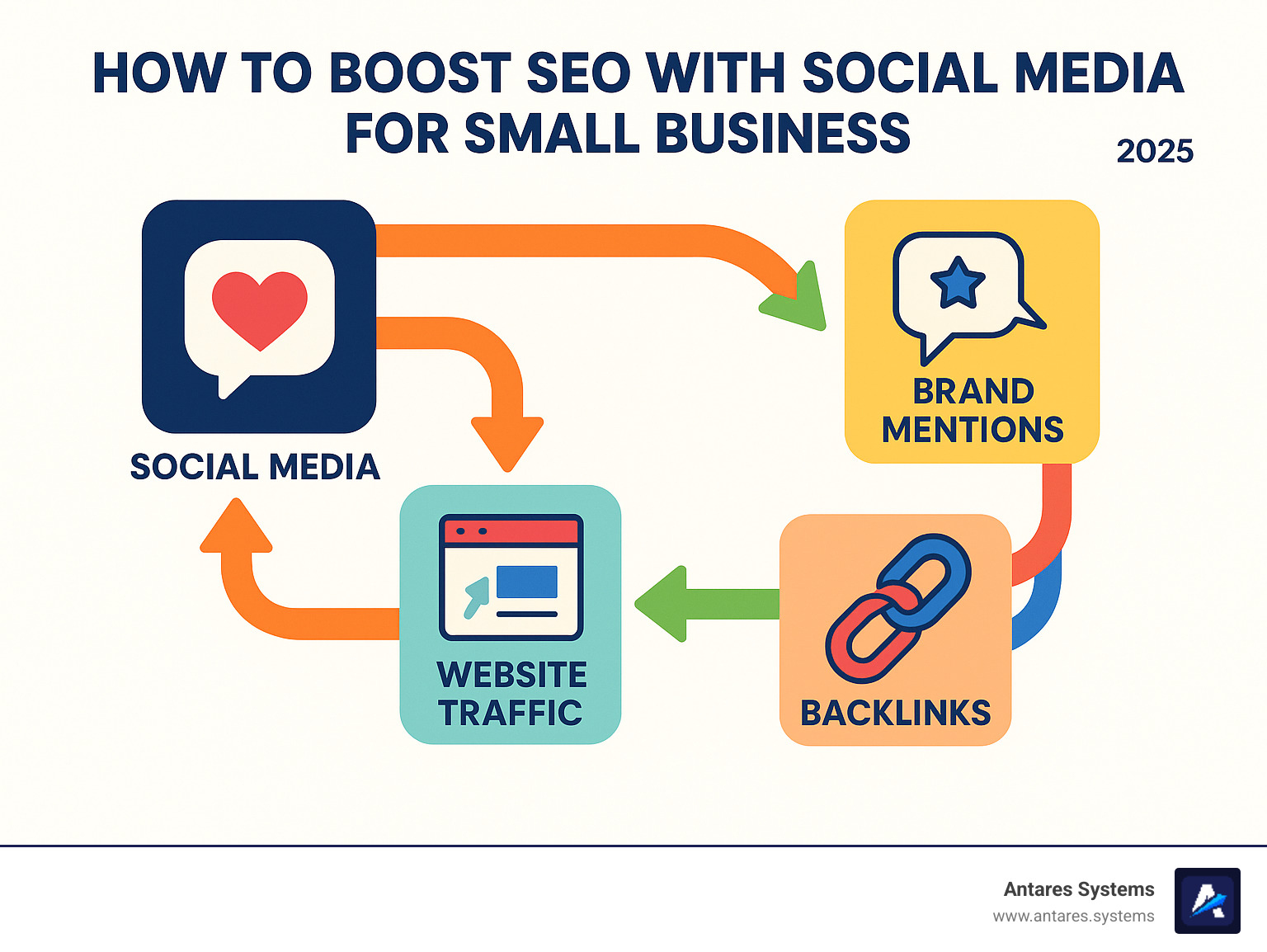
Why Social Media is Your Secret SEO Weapon
Social media is quietly becoming one of the most powerful SEO tools for small businesses, and many of your competitors haven't realized it yet. When you learn how to boost SEO with social media for small business, you're not just gaining followers; you're building search rankings, brand authority, and the trust that converts browsers into buyers.
While Google is secretive about social signals directly affecting rankings, the indirect SEO benefits are undeniable. When people are talking about your business online, Google notices. Even Bing openly admits they consider social signals when ranking websites, so your social activity is working harder than you think.
The real magic is that social media is now a search engine. Your potential customers aren't just Googling; they're searching directly on Instagram, TikTok, and Facebook to find what they need.
Understanding Social Media's Influence on Search
Here's a game-changing statistic: 40% of consumers prefer finding brands on social media over traditional search engines. This is a fundamental shift in user behavior.
Imagine someone in McAllen looking for a contractor. They might search "home renovation McAllen" on Instagram or check Facebook for local recommendations. If your business appears with an optimized profile and engaging content, you've intercepted a customer before they even open Google.
This also creates link building opportunities. When people share your content or mention your brand, you earn valuable brand mentions that search engines love. Even if social links don't pass direct SEO authority, they drive real traffic and often lead to natural backlinks from other websites, creating a snowball effect that boosts your search rankings.
Building Trust and Authority to Boost SEO
Social media is your secret weapon for E-E-A-T(Experience, Expertise, Authoritativeness, and Trustworthiness). Sharing behind-the-scenes content, answering questions, or posting helpful tips demonstrates your expertise and builds a brand reputation that search engines reward.
Customer reviews and user-generated content are even more powerful. When happy customers post photos of your work or leave glowing reviews on your Facebook page, they send trust signals that boost your SEO.
An active, transparent social presence helps overcome consumer skepticism. About 37% of consumers worry about sharing data with brands they only know from social media. When potential customers see you responding to reviews, engaging with your community, and consistently sharing valuable content, it builds trust that translates directly into better search rankings. Google rewards businesses that real people trust.
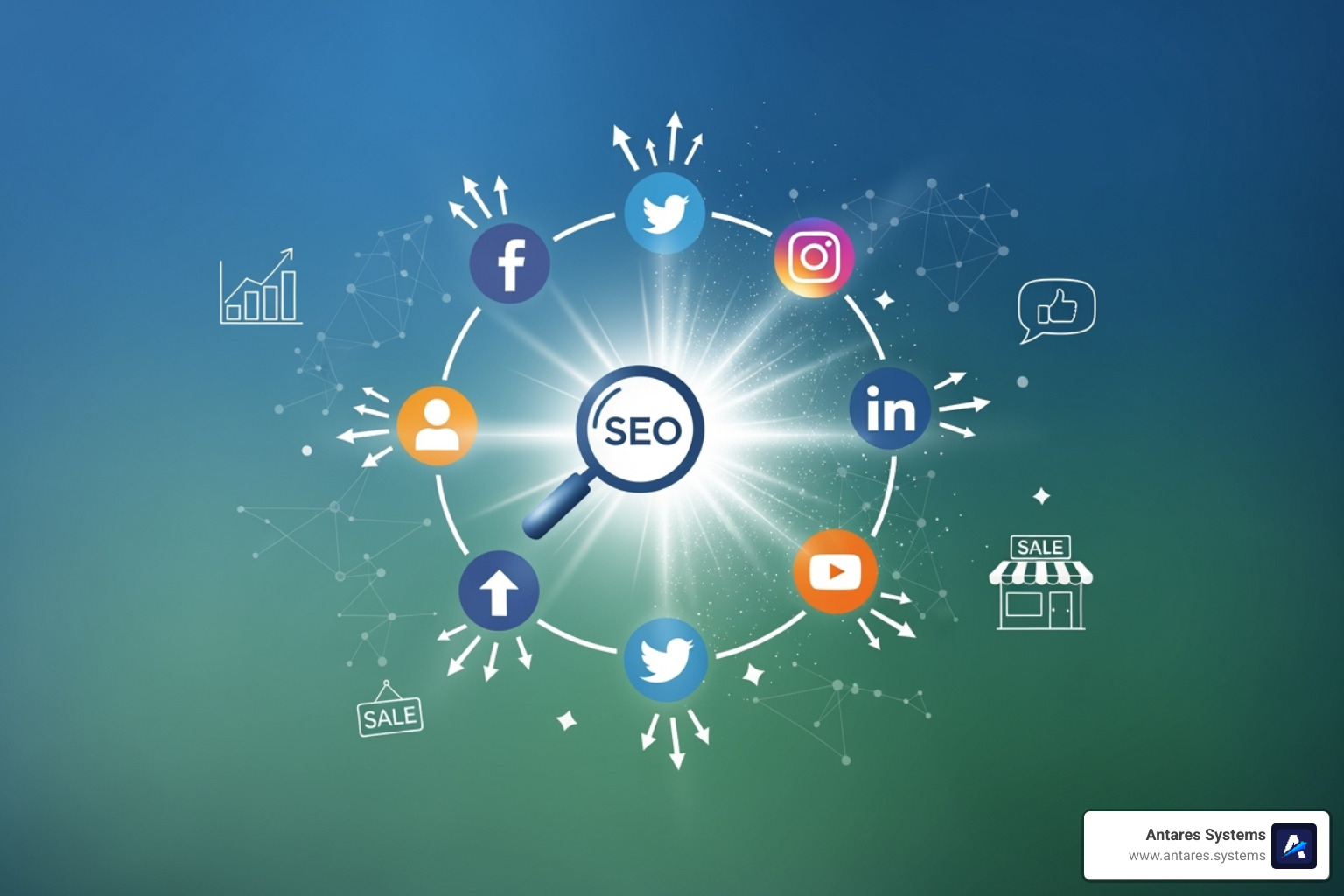
The Foundation: Optimizing Your Social Profiles for Search
Your social media profiles are digital storefronts. When someone searches for your business on Google, these profiles often appear on the first page. To be effective, they must be optimized correctly.
Profile optimization means treating each account like a mini-website. Use keyword-rich bios, consistent branding, and accurate NAP (Name, Address, Phone) information to help with local SEO. A clear call-to-action should guide visitors to your website.
Optimized profiles rank high in search results for your business name, giving you more real estate on Google's first page and more opportunities for customers to find and trust you.
Creating a Consistent and Professional Brand Presence
Inconsistency across social platforms creates confusion and erodes trust. When your branding is professional and cohesive, you signal to both customers and search engines that you're a legitimate, established business.
- Username Consistency: Use the same handle across all platforms where possible.
- Professional Profile Picture: Use your logo or a high-quality headshot.
- Branded Cover Photos: Showcase your services, promotions, or brand personality.
- Clear Business Description: Fill out every field, especially the "About" sections, with keyword-rich descriptions.
- Link in Bio: Always include a link that takes people directly to your website.
When everything matches, customers feel confident, and search engines reward this consistency with improved online authority.
Weaving Keywords into Your Social Profiles
Apply the same keyword research principles from your website to your social profiles. Think about what your ideal customers search for, including long-tail keywords like "emergency plumbing McAllen Texas."
Sprinkle these keywords naturally into your profile headline on LinkedIn, your bio on Instagram, and your "About" section on Facebook. Describe your services using the same language your customers use.
Your hashtag strategy is also crucial for findy within each platform. Mix popular industry hashtags with specific local ones to broaden your reach. The goal is to be helpful and clear, not to stuff your profile with keywords. Each optimized profile is another chance for a customer to find you.
If you're just starting out, our guide on How to Get Started with Social Media Marketing: A Beginner's Guide breaks it down step by step.
Platform-Specific Strategies to Boost SEO with Social Media for Small Business
Each social media platform has its own audience, algorithm, and content preferences. To truly boost SEO with social media for small business, you need to tailor your strategy for each one. This platform-specific optimization compounds your SEO efforts, giving customers multiple channels to find you and strengthening your overall online authority.
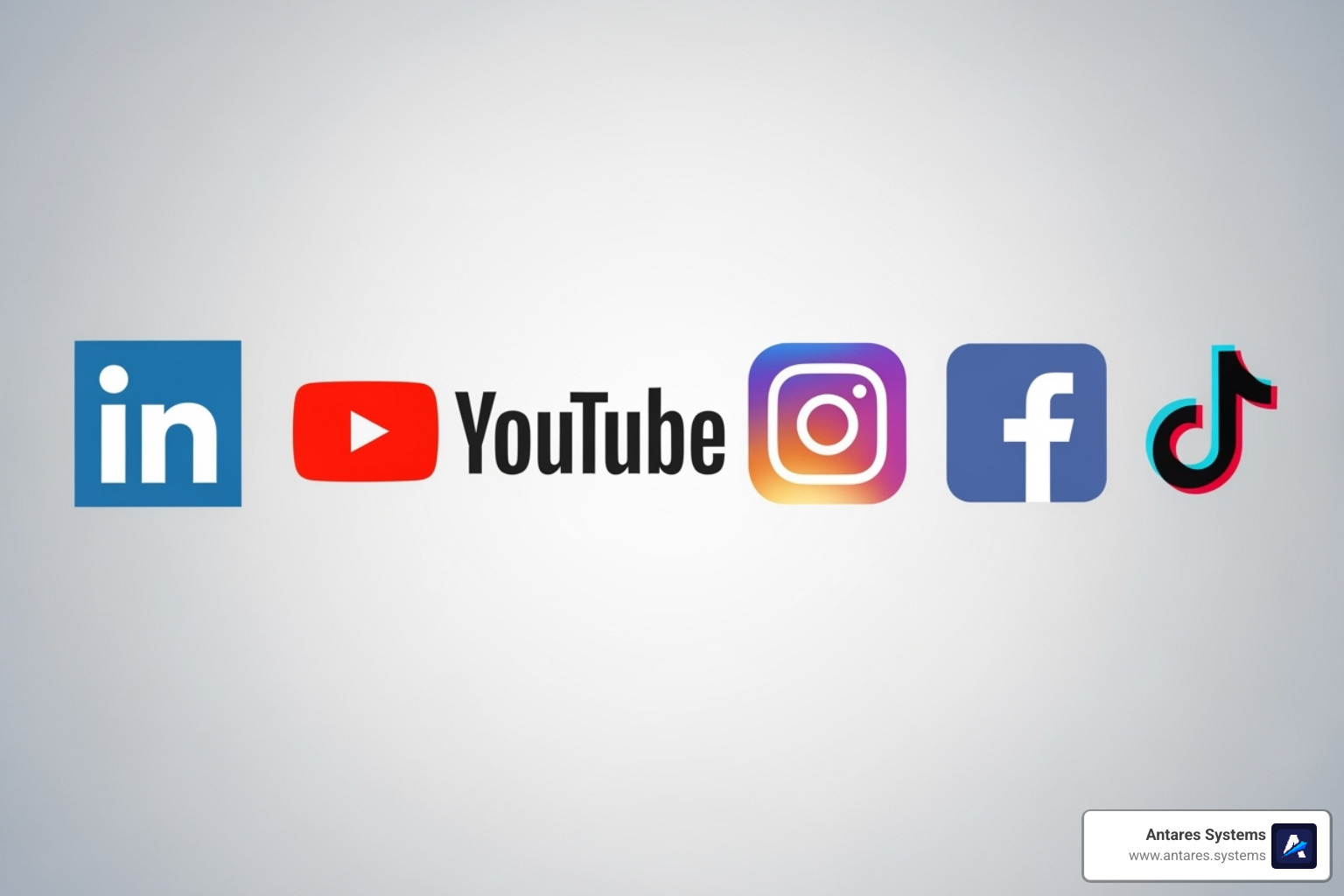
Professional Networking Platforms: Building Authority and Connections
For B2B services, LinkedIn is a goldmine. Optimize your LinkedIn headline with keywords (e.g., "Emergency Plumber Serving McAllen & Rio Grande Valley"). Publish articles on LinkedIn that showcase your expertise; they get indexed by Google. Join relevant industry groups to demonstrate your knowledge and connect with potential clients. If you have a team, encourage employee advocacy by having them share company content to multiply your reach.
Video Sharing Platforms: Tapping into Search and Engagement
YouTube is the world's second-largest search engine. People search for "how-to" videos and service tips. Optimize your video titles and descriptions with primary keywords. Provide video transcripts and captions, as they give search engines text to crawl and improve accessibility. Create custom thumbnails that stand out and accurately represent your video's content.
Visual Platforms: Driving Findy with Imagery
Instagram is a powerful search engine for local businesses. Use alt text for images to describe your visual content for search engines—a commonly missed opportunity. Location tagging is crucial for appearing in local search results. Optimize your Instagram bio to clearly communicate the problem you solve for customers. Use short-form video features like Reels with trending audio to reach new audiences.
For help with setup, see our guide on How to Create a Business Profile on Facebook.
Community and Local Engagement Platforms: Connecting with Local Customers
Facebook remains essential for local businesses. Optimize your Facebook Business Page, incorporating keywords naturally in your "About" section. The customer recommendations and reviews feature builds trust and creates fresh, keyword-rich content that search engines love. Participate in local Facebook groups to establish your business as a trusted local resource—be helpful first, promotional second.
To build your review presence, check out our guide on How to Ask for Recommendation on Facebook.
Trend-Driven Short-Form Video Platforms: Staying Relevant and Visible
TikTok's algorithm can provide massive reach. Use long-tail keywords in your descriptions, focusing on specific problems like "fixing squeaky door hinges." Participate in trending topics and challenges that align with your business to showcase your expertise in an entertaining way. On TikTok, platform-specific SEO means creating genuinely engaging content, as the algorithm prioritizes watch time, comments, and shares.
For timing your posts, our research on Las mejores horas para publicar en TikTok 2024 can help.
Turning Social Content into SEO Gold
Your social media is a content testing ground. When a post gets high engagement, your audience is telling you what they care about. You can take these winning ideas and turn them into evergreen content that drives website traffic long-term.
This is how to boost SEO with social media for small business: let your social success guide your content strategy. You're no longer guessing what to create; you're building on proven topics for an audience that already trusts your expertise. When you invite these engaged followers to your website, they are more likely to stay, read, and convert.
For more practical strategies, see our guide on 12 Social Media Marketing Tips for Your Business.
Driving High-Quality Traffic Back to Your Website
Every link you share is a pathway to your website, but you need to give people a reason to click. Don't just post a link; tell a story or solve a problem. Use a call-to-action that creates curiosity, like "Get the complete checklist" or "See how we helped a client increase leads by 40%."
Tease your best content by sharing an interesting statistic or asking a thought-provoking question, then invite them to learn more on your website. When users click through and spend time on your site, these engagement signals (like time on site) tell Google your content is valuable.
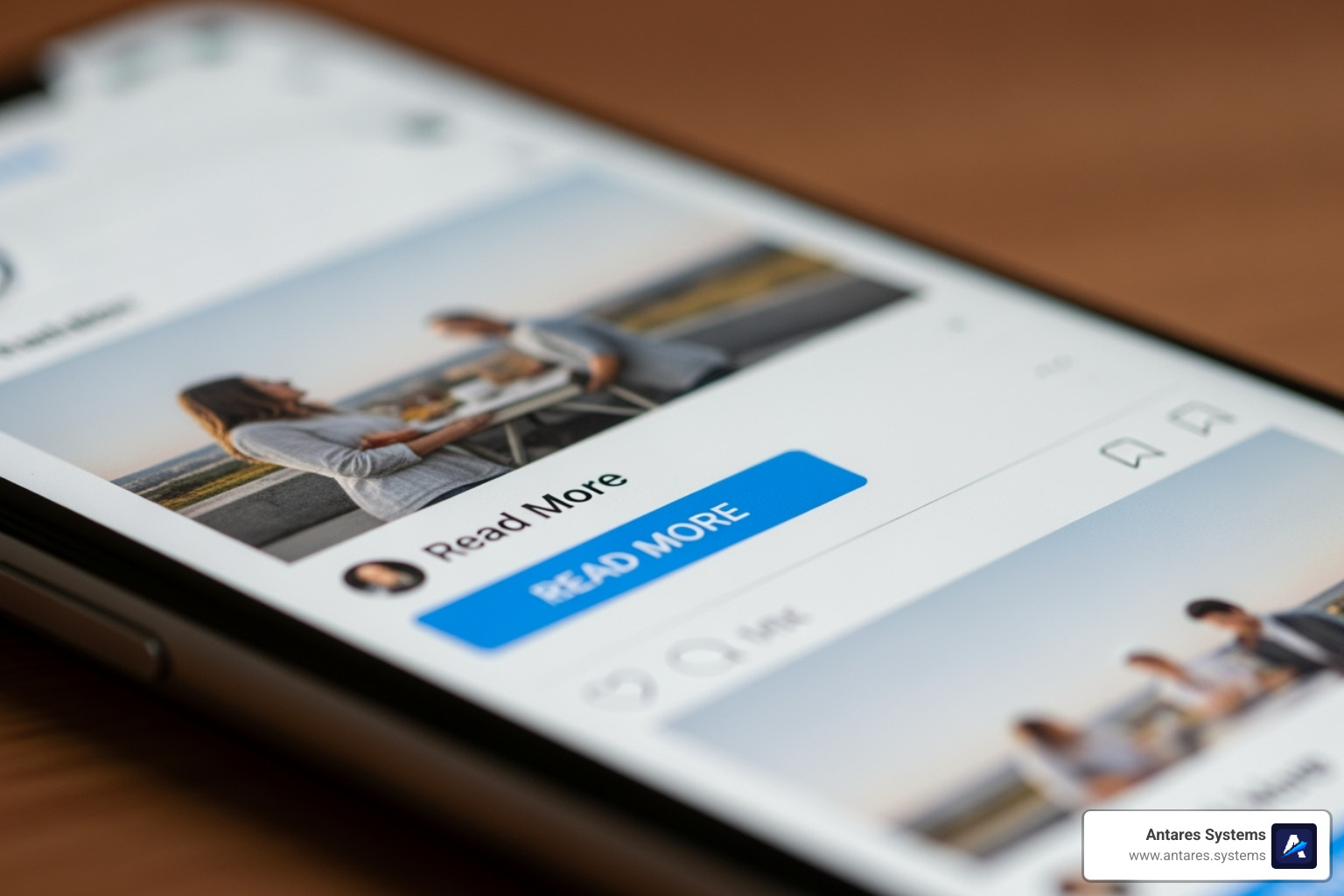
Repurposing Social Hits into Evergreen SEO Assets
When a social media post performs well, your audience is voting with their attention. That's your cue to expand that content into a permanent SEO asset on your website. You already know the topic works; now you're giving it a home where it can generate traffic for years.
Here are five ways to repurpose a popular social media post for SEO:
- Expand a popular Instagram post into a detailed blog post. If a quick tip got dozens of comments, turn it into a comprehensive guide on your website.
- Turn a Twitter thread into a comprehensive guide. Expand each tweet into a full section of a blog post with examples and actionable steps.
- Transform a popular video into written content. Transcribe a high-performing TikTok or YouTube video and expand on each point to create a keyword-rich article.
- Convert a data post into a detailed infographic and article. If an interesting statistic got high engagement, create a full article around it with context and sources.
- Use a Q&A session to create an FAQ page. Questions from your comments or live sessions are perfect for building an FAQ page that can rank for specific search queries.
Measuring Success and Refining Your Strategy
To boost SEO with social media for small business, you must track your progress. Every post and click tells a story about what's working. Thriving businesses pay attention to this data and adjust their strategy accordingly. For help setting goals, check out Which Should Be Your Social Media Marketing Goals for 2022.
Key Metrics to Track for Social Media SEO
Follower counts are a vanity metric. Focus on numbers that show real business impact:
- Referral Traffic: Use Google Analytics to see which social platforms send visitors to your website. This tells you where to focus your efforts.
- Engagement Rate: Likes, comments, shares, and saves signal that your content has value to both users and algorithms.
- Reach and Impressions: Track how many people are seeing your content. Growing reach with flat engagement may signal a need for a content adjustment.
- Click-Through Rate (CTR): This measures how effective your call-to-action is for posts with links.
- Brand Mentions: Use social listening tools to track untagged mentions, which build authority and awareness.
- Share of Voice: This shows how much of the online conversation in your industry you're capturing compared to competitors.
The Importance of a High-Performing Website
Even the best social media presence will fail if it leads to a slow, confusing, or broken website. Your social media attracts customers, but your website is where the conversion happens. A visitor who clicks from Facebook and finds a site that takes too long to load will leave immediately.
Website speed and mobile-friendliness are direct Google ranking factors. Most of your social traffic will be mobile, and Google uses mobile-first indexing. A poor user experience (UX) will prevent visitors from converting into customers. Your site must be fast, look great on a phone, and clearly guide users to take action.
At Antares Systems, we see this constantly. That's why our Smart Website Design focuses on creating sites that work seamlessly with your social media, turning followers into customers across the Rio Grande Valley.
Frequently Asked Questions about Social Media and SEO
We hear these questions all the time from small business owners. Here are straight answers to help you boost SEO with social media for small business.
Does social media directly impact my Google ranking?
It's complicated. Google officially says social signals like likes and shares are not a direct ranking factor. However, the indirect impact is where the magic happens. An active social presence creates a chain reaction of SEO benefits:
- It builds brand authority that Google notices.
- It drives traffic to your website, signaling to search engines that your site is valuable.
- It creates backlink opportunities when your content is shared by blogs or news sites, which is a direct ranking factor.
So, while there's no direct line from a 'like' to a #1 ranking, a strong social presence is highly correlated with better search performance.
Which social media platform is best for my small business's SEO?
There is no single best platform. The right choice depends on your business:
- Target Audience: Go where your customers spend their time. A law firm in the Rio Grande Valley will likely find more success on LinkedIn than on TikTok.
- B2B vs. B2C: LinkedIn is excellent for B2B, while Facebook and Instagram are typically better for B2C.
- Content Strengths: If your work is visual, use Instagram. If you excel at explaining complex topics, use YouTube or LinkedIn articles.
Focus your energy on two or three platforms where you can consistently create valuable content for your target audience, rather than spreading yourself too thin.
How long does it take to see SEO results from social media efforts?
SEO is a long-term strategy. You are building authority and trust, which doesn't happen overnight. Consistency is more important than perfection.
- Timeline: Most businesses see meaningful SEO improvements within 6-12 months of consistent effort. You will likely see increased website traffic and engagement much sooner.
- Competition: Results may take longer in a highly competitive industry. However, since most small businesses don't integrate social media and SEO well, consistent effort can help you stand out faster.
- Compounding Effects: Your efforts build on each other. As your social presence grows, so do your website visits, branded searches, and backlink opportunities, creating momentum that accelerates your progress.
Conclusion: Integrate, Analyze, and Dominate
The key to how to boost SEO with social media for small business is integration. These two powerful forces work together, each making the other stronger. Your social posts build trust, your Google reviews boost rankings, and your Instagram photos drive website traffic.
The secret isn't just posting more; it's creating an integrated marketing strategy where every social action supports your SEO goals.
We've covered the roadmap, from optimizing profiles to repurposing winning content. But remember: all the social media content in the world won't help if it leads to a slow, confusing, or broken website. A high-performing, mobile-friendly website is the critical foundation for turning social media followers into customers.
At Antares Systems, we see this connection daily with our clients in the Rio Grande Valley and beyond. Continuous improvement is what separates businesses that thrive online from those that struggle. Our AI-powered marketing solutions are built on this integrated approach. We don't just manage social media or optimize a website; we create a complete system where everything works together, from Smart Website Design to Local SEO.
By combining a smart social media presence with a solid technical SEO foundation, your small business can create a powerful engine for growth.
Ready to boost your online presence? Learn more about our expert Local SEO Services




